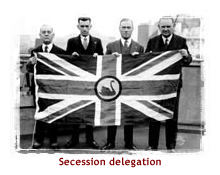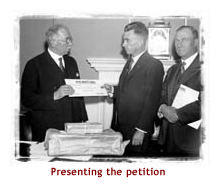 |
London
 The Western Australian Secession Delegation arrived in London in 1934 with
high hopes. The Agent-General, Sir Hal Colebatch, a former conservative
Premier of Western Australia and one of the government-appointed representatives,
used his offices in London to promote the delegation's cause. He gave numerous
speeches to meetings and dinners in which he summarised the Delegation's
case for secession
for the British public, press and politicians.
The Western Australian Secession Delegation arrived in London in 1934 with
high hopes. The Agent-General, Sir Hal Colebatch, a former conservative
Premier of Western Australia and one of the government-appointed representatives,
used his offices in London to promote the delegation's cause. He gave numerous
speeches to meetings and dinners in which he summarised the Delegation's
case for secession
for the British public, press and politicians.
The essence of the delegation's mission, and therefore its fundamental weakness,
was to persuade the British Parliament to overturn the Act of Parliament
with which they had formed the Commonwealth of Australia and given to the
Australian people their Constitution. Colebatch argued that
"Our opponents lay great stress on the words contained
in the preamble to the Commonwealth of Australia Constitution Act:
'Have agreed to unite in one indissoluble Federal Commonwealth under the
Crown of the United Kingdom of Great Britain and Ireland and under the
Constitution hereby established'.
They emphasise the word 'indissoluble'. We insist on the equal importance
of the rest of the section: 'Under the Crown' and 'under this Constitution'.
Will it be contended that if - a highly improbable suggestion - the always
loyal Commonwealth of Australia decided to break away from the British
Crown and establish a republic, we in Western Australia should still be
bound in the 'indissoluble Federal Commonwealth?'.
 Our
contention is that the words 'under the Constitution hereby established'
are of equal significance, and if we can demonstrate - as we are prepared
to do - that in a number of essentials, the Constitution has been violated
to our detriment, we are entitled to be relieved from our bargain. The
federation is a partnership between six States in which certain guarantees
were given and certain safeguards were provided. We can show that these
guarantees have been violated - that these safeguards have been swept
aside - and so we ask for the annulment of the partnership. Our
contention is that the words 'under the Constitution hereby established'
are of equal significance, and if we can demonstrate - as we are prepared
to do - that in a number of essentials, the Constitution has been violated
to our detriment, we are entitled to be relieved from our bargain. The
federation is a partnership between six States in which certain guarantees
were given and certain safeguards were provided. We can show that these
guarantees have been violated - that these safeguards have been swept
aside - and so we ask for the annulment of the partnership.
After all, what does the word 'indissoluble' mean? Remember that it occurs
only in the preamble and not in the Act itself. Is any arrangement made
in this world indissoluble? Can the rulers of any country 'dressed in
a little brief authority', bind the people of that country not merely
to the third and fourth generation, but for all time? Is there either
justice or common sense in continuing an agreement that is working badly?
Is a party to that agreement - after giving it a trial for 35 years and
having proved it to be hampering to its industries, destructive to its
prosperity and a grave bar to its development - prohibited from seeking
relief?"
[Battye Library, Acc 240A]
|
 |
 The Western Australian Secession Delegation arrived in London in 1934 with
high hopes. The Agent-General, Sir Hal Colebatch, a former conservative
Premier of Western Australia and one of the government-appointed representatives,
used his offices in London to promote the delegation's cause. He gave numerous
speeches to meetings and dinners in which he summarised the Delegation's
case for secession
for the British public, press and politicians.
The Western Australian Secession Delegation arrived in London in 1934 with
high hopes. The Agent-General, Sir Hal Colebatch, a former conservative
Premier of Western Australia and one of the government-appointed representatives,
used his offices in London to promote the delegation's cause. He gave numerous
speeches to meetings and dinners in which he summarised the Delegation's
case for secession
for the British public, press and politicians.